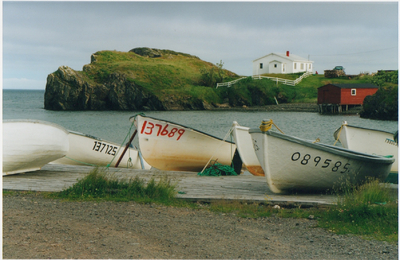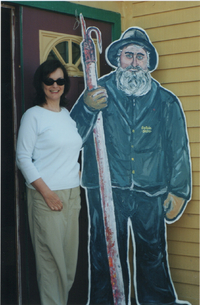Hunting Higdens in Newfoundland
by Jane Spencer
With no documentation or living family left to question, it seemed a long shot to trace my grandmother’s roots in Newfoundland. My father used to say his mother was from Harbour Grace, that she worked ‘in service’ there. My aunt said no, she was from Salmon Cove or perhaps Trinity. My internet search was proving futile. Without my grandmothers’s birth certificate, birth date, baptism records (which apparently burned in a church fire) or even childhood photos, I didn’t have much to go on. I would have to travel to Newfoundland & Labrador to see what I could dig up, and I would take along my favourite chauffeur, my husband John.
My ancestors emigrated to Ontario from Newfoundland about a hundred years ago. My grandparents George Spencer and Elfreda Higden were both Newfoundlanders, as were their parents and grandparents before them. George died at age 50, but Alfreda lived on to age 83, spending her final days living with us in her ‘granny suite’. I decided to focus my genealogical search on her.
Here’s what I was told about my grandmother. She was a staunch Methodist, she loved the monarchy, and her deafness was caused by a childhood case of diphtheria. This instilled in her a suspicion and a fear that others were always talking against her, and it gave her a crabby edge. She fought with her husband incessantly.
Here’s what I remember about my grandmother. Into her eighties she weighed about 100 pounds and kept her grey hair curled up in bobby pins day and night. She could lipread from across the room, and she squinted her eyes and shook her cane if she didn’t like what she saw. She had these strange expressions like “Stay where yer at, and I’ll come where yer to” and “Mind yer mouth.”
One day, I was deadly embarrassed to catch Elfreda in her raggedy fur coat hitchhiking near our house in the suburbs down to the mall. I ran in to tell my father, but all he said was: “You know she’s from Newfoundland” as if that explained everything. I supposed that Newfoundland was like another country, where they did things differently.
In the basement archives of the United Church of Canada in St John’s, I poured through documents. In vain, I turned the brittle pages of baptism ledgers inside a white steeple church in Harbour Grace and checked the gravestones outside. I even peered hopefully at old photographs displayed in the museum. I don’t think Salmon Cove (now called Champneys) even had a store, but I took photos of the unemployed boats - due to the cod fishing moratorium - pulled up on shore. Trinity didn’t divulge any secrets either, though it did offer up seaside hikes, whale watching and brilliant live theatre.
Wherever I went, I imagined my grandmother, a hundred years ago, walking the foot paths, standing on the shorelines and clutching her coat against the Atlantic wind. I felt her spirit within me, embraced by the larger spirit of the land and sea.
The only place not on my search list was a town called Dildo. We went there for a lark. Tee-hee. How did the Methodists let that one go by? Unless ... the name had an entirely different meaning? Our bed & breakfast host, most likely tired of the smirks, had placed on the bedroom dresser, a newsletter listing some possible explanations (minus the obvious one) for the naming of Dildo. I was too polite to question him further. He must have appreciated that, because he invited my husband and me down to the Fishermen’s Hall that very night for his cousin’s engagement party.
After we ate homemade chili at a local cafe, strolled the harbour, visited the whaling museum and posed for photos beside a life-size cardboard Captain Dildo, we headed over to the party. The hall was meant to hold hundreds of people. Long folding tables lined the walls, leaving the centre clear for dancing. The bartender was opening the bar, the deejay was preparing the tunes, the guests were gradually drifting to their tables, but our host was nowhere in sight. To avoid looking like party crashers, we busied ourselves by studying the many dedicated photos and plaques and admiring the two hundred foot mural of the proverbial old man in the sea, bright yellow slicker, near tsunami waves crashing down on his boat.
Feeling awkward, not sure if we should, we eventually took seats at a table of strangers and said hello. Five minutes later, we were being semi ‘screeched-in’ by our new friends. Getting ‘screeched-in’ is an initiation ceremony whereby the visitor downs a shot of ‘Screech’ rum then kisses a codfish. There were no codfish available, but I did drink the ‘screech’ which tasted like regular rum.
I announced to our table companions that I had come to Newfoundland in search of my heritage, particularly my grandmother’s. “What was her name?” asked a woman in her forties.
“Higden” I told her.
“Ya hear dat, Joe? Her name was Higden. Hey Pat, her nan was a Higden b’y.”
For some reason this produced a gale of laughter at the table. “Aw luv, we’s all Higdens here. He’s a Higden, she’s a Higden and I’m a Higden too.”
I was gob-smacked. After two weeks of crisscrossing eastern Newfoundland to no avail, I had found my people at the Fishermen’s Hall in Dildo. Or, so I hoped.
Then Pat cried out: “Mudder, she’s got the sign too.” The sign?
The ‘sign’ turned out to be the prominent dimple in my chin. It seems every Higden at the table had one.
As it turned out, the swapping of names and places did not really match up, so I doubt they were my long lost relatives. While my husband and I were up dancing, the Higdens I’d been talking to slipped away into night and I never saw them again. Maybe they made the whole thing up about being Higdens, and if that was the case, it was one fine example of Newfoundland hospitality.
Jane Spencer is a retired teacher from Canada who knows that adventure travel is the best classroom of all. She hopes to make it to every continent and is currently working on a book of travel stories.




